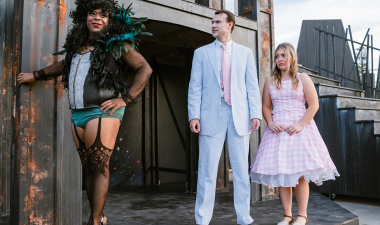A new play conceived by two Stanislaus State alumni and started during the height of the COVID-19 pandemic is set to premiere on the Mainstage Theater on Wednesday, Nov. 16, and run for three more performances through Saturday, Nov. 19.
Titled “Hedda on Fire,” the play focuses on an ambitious bacteriologist’s quest to solve the climate crisis while grappling with a difficult relationship, misophonia and eco-terrorism.
The production has its roots in Stan State Assistant Professor of Acting and Directing Carin Heidelbach’s desire to focus a play on science in a way that is relatable and might help people identify and reject scientific misinformation in their daily lives, including some of the falsehoods spread during the pandemic.
Heidelbach (’91) teamed up with fellow alumna and playwright Jeanette Farr (’93) to bring her vision to life. The two worked on the play for about two years and finalized the writing at the end of October.
Heidelbach said she and Farr have always wanted to adapt a work by Norwegian playwright Henrik Ibsen, considered by many to be the father of realism in drama. While they started with an idea for an adaptation of Ibsen’s “Hedda Gabler,” she said, the new play became more of a “derivative” inspired by Ibsen and his protagonist — a strong, independent woman trapped by 19th century society’s expectations of her.
“She is the quintessential bored woman in late 1800’s Norway who really should have been more than just a wife, sitting in a house, taking care of her husband,” Heidelbach said. “She just wasn’t cut out for that.”
Heidelbach and Farr’s Hedda is a bacteriologist working with other scientists in a lab in the near future. While they research ways to save the world’s environment, Hedda experiments with methanotrophs, a unique type of bacteria that consumes methane as its only source of energy, thereby preventing it from entering the atmosphere.
“As the play unfolds, you learn more about the characters, their relationship to the climate crisis, and what they want to do or not do about it,” Heidelbach said. “And then Hedda goes on a journey of sorts, and we leave the realm of realism and move on to something entirely different, where bacteria talk, the planet talks, and ultimately the planet tells her what to do.”
And that is all Heidelbach will say about the play’s plot. Anyone who wants to know what happens next will need to see the show.
During its development, the play was workshopped at Stan State and in Los Angeles and Minnesota, the latter because Heidelbach and Farr were invited to the Tofte Lake Center, an artist retreat. Heidelbach said workshopping the play there turned out to be a nice nod to Ibsen’s Norwegian heritage because a large population of Norwegian Americans live in Minnesota.
Heidelbach is planning to take the production and a group of about 12 students, faculty and community members to Scotland for this summer’s massive Edinburgh Festival Fringe, which bills itself as the “single greatest celebration of arts and culture on the planet.” The group plans to perform “Hedda on Fire” four times during their two-week stay at the festival in August. A fundraiser is underway to cover expenses.



